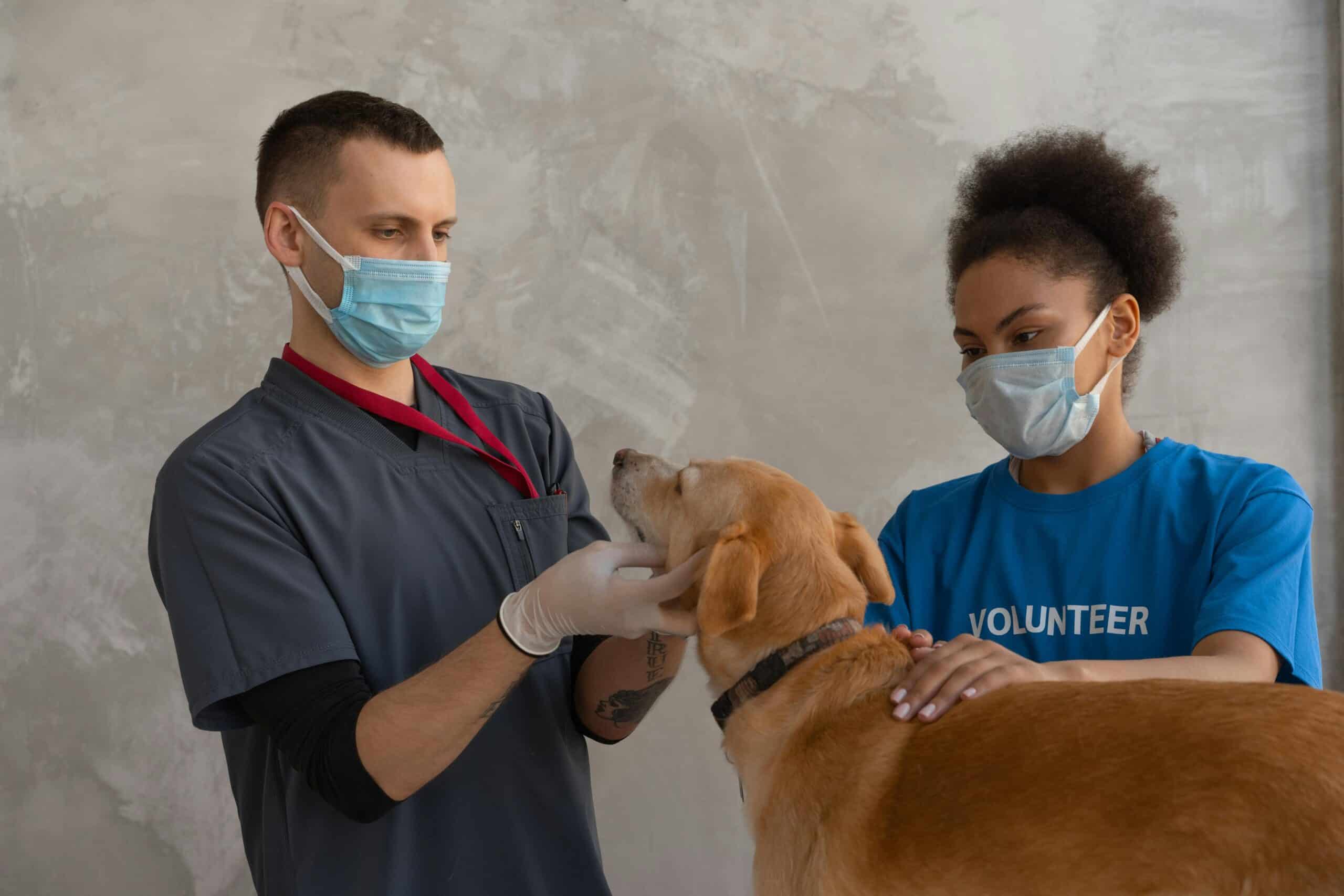What Vaccines Does Your Pet Need?
Posted by Lora Shaw on March 8, 2024

Whether they’re juvenile or full grown, your pets will need different vaccines at different phases of their life. If you’re wondering just which vaccines you’ll need to take care of to ensure your pet stays healthy, you’ve come to the right place. Let Pet Palace cover the essentials!
Determining a Vaccination Schedule
Vaccinating your pet promotes long-term health, prevents disease, and helps avoid costly treatments such diseases bring about.
If you’re unsure on where to start with vaccines for your pet, working with a veterinarian will help you determine the best plan of action based on your pet’s species, age, health status, lifestyle, and more. Then, when your pet has regular checkups, you can discuss the vaccination plan, address any concerns, and ensure that your pet is remaining healthy.
Vaccines for Dogs
Puppies typically receive a series of vaccinations that start around 6-8 weeks of age. Then, they get boosters every 2-4 weeks until they are around 16-20 weeks old. While some dogs have different needs, there are common viruses and diseases that all dogs should be protected against.
Here is a list of core vaccines that all dogs should have:
- Canine distemper virus (CDV) – This vaccine covers a highly contagious virus that impacts the respiratory, gastrointestinal, and nervous systems. The vaccine is administered every three years after the primary series of puppy vaccinations.
- Canine adenovirus (CAV) type 1 and 2 – This vaccine is used to protect against canine hepatitis and respiratory infections.
- Canine parvovirus – This vaccine is for a severe gastrointestinal illness that can be fatal, especially for puppies. It is often combined with DHP.
- Rabies – This one is vital because rabies is fatal to humans and other mammals, which is why the vaccine is required by law. The law even dictates the age and intervals required for treatment.
Based on the lifestyle, habits, and age of your dog, you might also want to look into vaccines that protect against the following:
- Bordetella – The Bordetella vaccine helps protect against canine or kennel cough. This is often required if you plan on taking your dog to boarding facilities, training schools, or day care.
- Canine parainfluenza virus – CPIV is an additional component of kennel cough, which is a highly contagious respiratory virus, so vaccinating against it is key.
- Leptospirosis – This is a bacterial disease that can be transmitted to dogs or other humans through the bacteria Leptospira. It is found in soil and water.
- Lyme disease – Lyme disease is an inflammatory disease that is transmitted via ticks. The vaccine is important for dogs that live in areas where ticks are common.
Additionally, it is crucial to get adult boosters for your dog that help maintain immunity. The frequency depends on the vaccine, geographic schedule, and even if you plan to travel with your pup.
Vaccines for Cats
Just like puppies, kittens should start receiving vaccines when they are 6-8 weeks old, up until they are around 16 weeks. And like dogs, all cats have different needs but should be protected from core diseases.
Here are the vaccines that your cat should have:
- Rabies – Since cats are mammals just like dogs, they can fall prey to the ravages of rabies, so they should always be vaccinated for it.
- Panleukopenia (also known as feline distemper) – It is important to protect against panleukopenia, as the disease is fatal in cats. It is transmitted through infected animals, their fluids, and contaminated environments, and it can be especially deadly for kittens.
- Feline calicivirus – These injections are given when the kitten is young, and the booster is administered every three years to prevent diseases associated with the pathogen.
Other vaccines you might want to look into for your cat depending on their lifestyle, habits, and phase of life include:
- Feline leukemia virus – This virus can impact a cat’s immune system and lead to other diseases, as it is the most common cause of cancer in cats, making getting a vaccine for it vital.
- Feline immunodeficiency virus – FIV is similar to HIV in humans, which can weaken the immune system.
If you’re unsure of which additional vaccines to give your furry friend, be sure to connect with your vet! They should know your cat’s medical history and can make suggestions based on their needs.
Vaccines Required for Boarding Your Dog or Cat at Pet Palace
Pet Palace wants to keep all pets within our facility safe and healthy, which is why we require proof of certain vaccines as a qualification for boarding. This prevents the spreading of contagious diseases between pets, encourages herd immunity, ensures compliance with legal requirements, and provides peace of mind for pet owners like you!
Before boarding your dog or cat at Pet Palace, please make sure your pet has the following vaccines:
- Dogs – DHPP, rabies, Bordetella, canine influenza (H3N2 and H3N8)
- Cats – FVRCP and rabies
Thank you for cooperating and contributing to the health of all pets in our facility!
Contact Us for Premium Pet Boarding
Are your pets vaccinated and ready for a royal vacation at our resort? Book your reservation today!
Be sure to contact us with any questions you may have.
Additional Resources to Check Out
Everything You Need to Know About Microchipping Your Pet
What Is the 3-3-3 Rule When Adopting a Rescue Dog

Categories: Dogs, Pet Safety, Tips for Your Pets
Archives
Recent Articles
Categories
Monthly Archive
- April 2025
- March 2025
- February 2025
- January 2025
- December 2024
- November 2024
- October 2024
- September 2024
- August 2024
- July 2024
- June 2024
- May 2024
- April 2024
- March 2024
- February 2024
- January 2024
- December 2023
- November 2023
- October 2023
- August 2023
- July 2023
- June 2023
- May 2023
- April 2023
- March 2023
- February 2023
- January 2023
- December 2022
- November 2022
- October 2022
- August 2022
- July 2022
- June 2022
- April 2022
- March 2022
- February 2022
- November 2021
- October 2021
- November 2020
- September 2020
- July 2020
- March 2020
- January 2020
- November 2019
- September 2019
- July 2019
- March 2019
- January 2019
- December 2018
- November 2018
- October 2018
- August 2018
- July 2018
- June 2018
- May 2018
- April 2018
- March 2018
- February 2018
- January 2018
- December 2017
- November 2017
- October 2017
- September 2017
- August 2017
- July 2017
- June 2017
- May 2017
- April 2017
- March 2017
- February 2017
- January 2017
- December 2016
- November 2016
- September 2016
- August 2016
- July 2016
- June 2016
- May 2016
- April 2016
- March 2016
- February 2016
- December 2015
- November 2015
- October 2015
- September 2015
- August 2015
- July 2015
- May 2015
- March 2015
- February 2015
- January 2015
- December 2014
- November 2014
- September 2014
- August 2014
- July 2014
- June 2014
- May 2014
- March 2014
- February 2014
- January 2014
- December 2013
- November 2013
- October 2013
- September 2013
- August 2013
- June 2013
- May 2013
- March 2013
